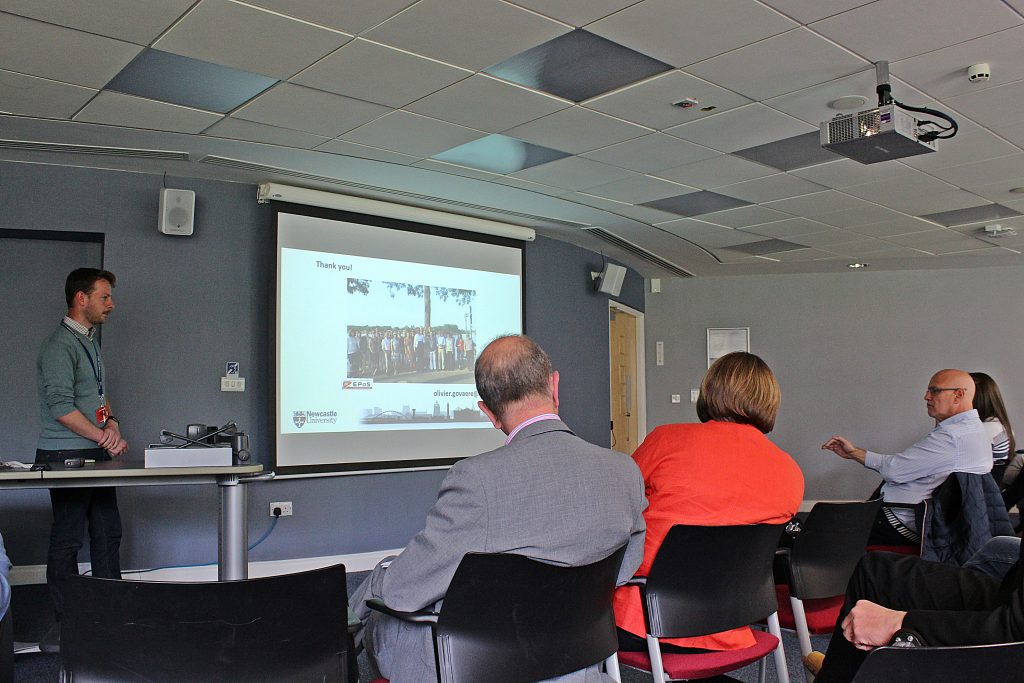Here is some general advice if you have to give an oral presentation.
Identify your audience
First, consider whether this is a presentation to a discipline-specialist group. The make-up of your audience will greatly influence what it is appropriate to present, so bear this in mind when pitching your talk.
How far did you get?
 The timescale for postgraduate research is tight, so you may well be delivering a work-in-progress. That’s fine; many conference presenters report work in progress. Think about the stage your project is at when planning you talk, for example:
The timescale for postgraduate research is tight, so you may well be delivering a work-in-progress. That’s fine; many conference presenters report work in progress. Think about the stage your project is at when planning you talk, for example:
– If the project and analysis are completed, give the audience the answer. Comment on what your work adds to human knowledge, and the further work you would do if you had the chance.
– If you are still collecting or analysing data, then your experience probably has a learning message for those present. Comment on problems with the study design or recruitment, even if they are going to be hard for some people to hear. Try to present preliminary results. Make recommendations for others who might seek to continue your work.
Leave things in or out for a reason
Typically, scientific presentations are shorter than you imagine. For example, conference podium slots can be as short as 5 minutes. Be selective about what to put in your talk; match up your material with your audience, and don’t try to cover too much.
Use the 3-minute thesis
The 3-minute thesis is an opportunity to present your research to a willing and non-specialist audience – in 3 minutes, and without slides. It began in Australia, and was introduced to the Medical School by Alison Tyson-Capper. The importance of clear communication in a limited time cannot be over-estimated.
We love the 3-minute thesis. Many students are scared by the idea, but after the experience are completely converted, and we have had students represent us in the National finals. Please – give it a go when you get the invite. You’ll love it.
I’m scared. How do I talk to a big audience?
 Surprisingly, a big venue is not as intimidating as you might imagine. You typically can’t see the individuals in the audience and even if you do, then you probably don’t know them personally. You might find it better than talking to a handful of close colleagues.
Surprisingly, a big venue is not as intimidating as you might imagine. You typically can’t see the individuals in the audience and even if you do, then you probably don’t know them personally. You might find it better than talking to a handful of close colleagues.
I never, ever saw somebody mess up catastrophically. But even if you did – which you won’t – it doesn’t matter. It’s all forgotten within minutes of leaving the hall.
What is the point of presenting at this stage in my career?
First, we want you to develop your presentation skills. It’s an important skill that you will call upon many times in your careers as scientists.
And second, your colleagues will have spent years supporting your journey. This is your opportunity to tell them and the wider scientific community what you’ve been doing.
Do you have any other comments/advice/suggestions for a presentation?
- Aim for 1 slide per minute.
- Be sparing with text. 30-point font size, max 3 lines of text per slide.
- You can’t make a talk too simple. Practice on people who don’t understand what you do.
- Know what you’re talking about, so you can ad-lib and answer questions. If you lose your place in a word-for-word rehearsed script, you’ll be in trouble.
- Tell a story. Entertain and be light-hearted – within appropriate limits.
- Make your slides tell the story. They will remind you what to say. But don’t read them; the audience will do that quicker than you.
- Speak slowly; it comes over with more authority.
- Pause to collect your thoughts if needed. Gaps appear much shorter to the audience than to the speaker.
- If you don’t know, admit it and don’t babble.
- Remember to breathe, especially when you’re nervous. Just taking a few deep breaths will help you to control your nerves as well as your voice.
 You can’t easily rehearse an entire talk from day 1. BUT – every one of you has favourite anecdotes that you can roll out in the pub or around the dinner table in an engaging way. It’s no different.
You can’t easily rehearse an entire talk from day 1. BUT – every one of you has favourite anecdotes that you can roll out in the pub or around the dinner table in an engaging way. It’s no different.
What works for me is to pick bits of the story and in my head, way ahead of time, figure how I’d explain them to someone else in a minute. Every time you refine it, find better words, find analogies, put the words and the pauses in the right order. You know the deal. Soon, you have a bunch of little stories that you can string together into a talk.
You might wonder how senior people can stand up and just talk without practising. The fact is, they can’t. They can stand up and just talk because they practised the words a million times over a lot of years.
Enjoy it. It shows.
